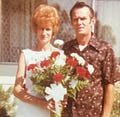When Ivan asked me, which story is my favorite that I’ve ever written, it didn’t take long for me to respond because I immediately knew the answer. Stories bring the past to life and revive memories. This story shares love and lets me celebrate my parents. It allows me to remind readers that laughter sparks healing.
As my parents aged, stories of their experiences growing older ended with a punchline; laughter made the tough times tolerable.
They would say, “You know you are getting old when you leave more on the nightstand than you take to bed.”
Mom removed the upper partial plate of her teeth, hearing aids and glasses. Dad deposited his teeth in a plastic Tupperware bowl beside the bathroom sink and laid his glasses on the nightstand. Depending on their current condition, a back, knee, or arm brace, bandages, or support socks littered the floor. In the corner, a manikin head sported the wig that mom used to conceal her hair loss.
My parents appreciated humor over pity in any situation; it added spice to life. However, it wasn’t until I shared a hotel room with them that I witnessed the result of their nightly ritual.
Mom, Dad, and I flew from Boise, Idaho to Denver, Colorado for yet another in a series of operations. Tuberculosis and numerous complications associated with the disease demanded constant care for Mom. The night prior to her next surgery, I laid in a queen bed beside my parents who were three feet away. Create a visual in your mind: two queen beds in a room with a dresser, table, two chairs, and a TV with just enough space to slide to the bathroom fifteen feet away. Imagine the 5-by-3 floral picture above the bed, the paisley bedspreads, and the two lamps that swing over the beds– a typical Hotel 8, Best Western, or a Ramada.
With my back to the bed that my parents shared, I listened to their conversation. It started out quite formulaic; if there was a larger family, it might have been a scene from The Waltons.
“Good night, Brenda.”
“Good night, Mom. Night Dad.”
“Night, Dena.”
“Night, Honey.”
A conversation trailed the good nights. Dad commented about dinner and Mom replied that the plane ride had been smooth. Dad continued talking about the meal and elaborated on the waitress’s service. Mom picked up on the last word and stated her satisfaction with the service on the plane. I began to take notice that the conversation followed two parallel lines of thought and contained no points of intersection. Dad complained about the rental car, mentioning it smelled fishy, only to get an enthusiastic agreement that fish would be great for lunch tomorrow. I listened as the dialogue grew further apart with each word.
When I could tolerate it no more, I sat up in bed, pulled forward the lamp and switched it on.
For some reason, I felt it necessary to interpret. “No Mom, Dad doesn’t want fish. He thinks the car stinks.” But before I could explain the misunderstandings, the paraphernalia strewn about the room caught my attention. He talked without teeth; she listened but could not hear.
I explained what I heard, and we laughed. We laughed at what I reported; we laughed at all the possible conversations in the past, and even anticipated future possibilities.
At the time, I didn’t realize how limited future bedtime conversations would be but now understand it wasn’t the words that were important. It was the proximity of their bodies, her voice, his arm around her waist, and the laughter.
The next morning Mom reported to the hospital. A nurse pushed her through the corridors while Dad and I straggled behind. The white, barren halls seemed impersonal. After pushing, walking, completing paperwork, pushing, walking, waiting, and repeating the pattern again, Dad and I discovered the signs. Their purpose was to direct patients and visitors to the different offices and waiting rooms like markers above the aisles in a grocery store. These read like a list: liver, kidney, heart, lungs, etc. and carried us down the hall as we created material for our own private comedy act that resembled a cross between Young Frankenstein and ER.
Just before beginning what we considered act two, we looked in front of us, to both sides, and behind to discover that Mom was gone. We retraced our steps and investigated each room until we located Mom and her nurse. At first, she didn’t laugh at the retelling of our one act play, but later we helped her find the humor.
We lived in that hospital for several weeks
The laughter made the time tolerable. One afternoon when sleep was fighting for Mom’s attention, I asked questions and had her share memories. She recited a limerick that left my mouth hanging open for it contained words that I couldn’t believe my mom knew. But she made her point; she could still make a joke. Her timing could have won her an Emmy and Bob Hope would have been envious.
Another day when Mom was extremely weak and wished to move from the bed to a chair, a male nurse assisted her. With her arms around his neck, face to face, she began humming and asked if he would like to dance. Watching Dad try to tie the back of her hospital gown as she did a two-step recalled scenes from the TV show, I Love Lucy, reminding me of times Ricky Ricardo scurried behind his wife trying to cover her chaos.
Those weeks became one long day with truly few stories to share. It was closer to a dream than reality.
I don’t remember at what point we began to accept that Mom wasn’t coming home. I don’t remember if words ever stated the inevitable, but we knew. I don’t know what we did while Mom slept through the drug-induced coma, and my recall of the conversation about living wills is a snapshot instead of a movie. But I know Dad and I talked to Mom, told her jokes, and sometimes we laughed in whispers through our tears.
There was a piece of abstract art in the hallway of the ICU. To this day I say it was a silhouette of a horse. Dad made it clear there was not a horse anywhere in the portrait but instead that the picture was simply a reflection of the artist’s mental stability or instability. So, each time anybody walked down the hall (nurse, doctor, therapist, janitor, aid, anybody) I asked them what they saw. This survey became my obsession and ultimately affirmed my suspicion; the picture was a horse. The nurses probably didn’t know what to think as either Dad or I practically attacked passersby to chart their observations. As Mom lay in the bed, we had become obsessed with art. That picture saved our sanity because it made us talk and sometimes laugh as we taunted and teased.
The laughter paused when Dad and I boarded a plane back to Boise. Memories from the plane ride to the choosing of the casket are void. But at some point, the laughter returned.
It was at a most inappropriate time to laugh if measured according to society’s standards, but when my family gathered, we began to feel emotions. The humor allowed us to talk about our loss and express our sorrow.
My daughter, Kat, shared this story of an experience at Grandma’s funeral.
“As Kari and I sat in the private backroom waiting for the funeral to start, it was almost impossible to make small talk. We sat in silence with our cousins and stared blankly at the walls.
“After an eternity had passed, Grandpa walked into the room and noticed the sadness and silence. There was a time to laugh, and Grandpa knew that we needed a laugh at that moment more than ever. He stood boldly in front of us and asked us how he looked. We all replied that he looked nice in his funeral attire.
“The question that then came out of my grandpa’s mouth caught us all off guard, ‘Do you think I’m sexy?’ We all just stared at him with wide eyes. Then without hesitation, Grandpa started taking off his suit jacket and proclaiming for the whole world to hear, ‘I’m too sexy for my jacket… too sexy for my jacket…’
“We all busted out into uncontrolled laughter in that small room meant for mourning. Grandpa knew that Grandma wouldn’t approve of us being sad and ignored his own grief to make us all laugh. Being a part of this family, I learned at an early age that laughter is the best medicine, even if it’s not always in the most appropriate situations.”
Writing is a constant experiment. For the month of November, I’ve challenged myself to respond to people’s questions with stories. I’ve always admired Dear Abby but know I do not have all the answers. Therefore, let’s change the perspective - Ask me a question; I’ll tell you a story.




